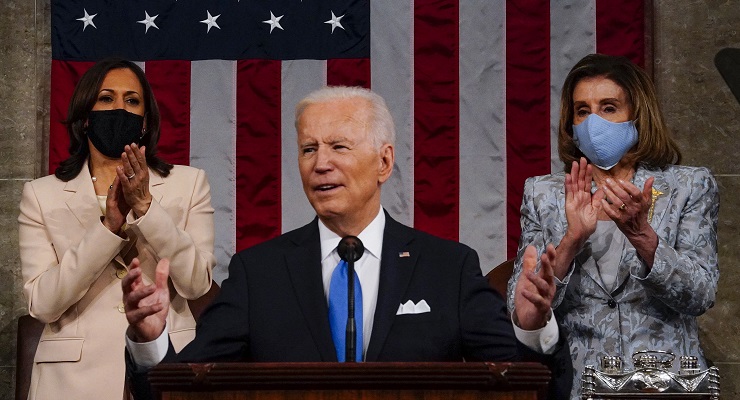
Over the course of his third bid for the White House, Joe Biden was considered by many to be the wrong man for the job. Too old, too cautious, too moderate, too gaffe prone. His opponent mocked him as “Sleepy Joe”. After finishing fourth in Iowa and fifth in New Hampshire during the Democratic primaries, the pundits all but wrote him off.
This is the problem with horse race politics and the “breaking news” cycle. Style trumps substance. Boring doesn’t rate. Boring, however, turns out to be an antidote to four years of constant chaos. It also provides perfect cover for a revolution in American government.
In his inaugural address President Biden repeated his call for unity, both to heal a divided nation and to draw on collective resolve to surmount America’s myriad challenges. He understands that many people believe this is naive.
His appeal was issued in the shadow of a violent insurrection just two weeks after domestic terrorists had stormed the Capitol behind him, in a last ditch effort to block his presidency.
Biden has no illusions about all that he confronts.
At the top of his list was crushing COVID-19 with masks and vaccines, and salvaging the economy with an expansive economic relief package. He promised to administer 100 million vaccine doses in his first 100 days. He has more than doubled that goal. More than half of all adults, including four in five aged 65 and over, have been jabbed. Congress enacted his $1.9 trillion American Rescue Plan to help families, businesses, and state and local governments.
Next up he pledged to tackle the existential threat posed by climate change. On his first day in office he signed an executive order recommitting the United States to the Paris Climate Accord. Last week he hosted a summit of world leaders, at which he announced that by 2030 the United States will reduce its greenhouse gas emissions by half from its 2005 baseline.
He also vowed to make the US power industry carbon-free by 2035, and has called on business leaders and scientists to partner with government to achieve this objective. He views climate change as both threat and opportunity. The transition to a clean energy future will create millions of jobs in new industries, restore America’s innovation primacy, and reassert American leadership in the world. It is a moon shot moment.
To propel his climate policies, Biden has incorporated significant energy initiatives in the next chapter of his Build Back Better agenda. The American Jobs Plan, a $2 trillion overhaul of America’s crumbling infrastructure, includes hundreds of billions of dollars to upgrade housing, transportation and utilities, and bolster modern manufacturing alongside significant investment in research and development. Coupled with the allied American Families Plan, a $1.8 trillion injection to support childcare, family care, health care, and public education, these 10-year proposals will transform American society.
Beyond these legislative initiatives, Biden has put the full force of the federal government behind his program. Cabinet departments and regulatory agencies are recalibrating their priorities and pivoting to resume their missions after four years of decay and neglect.
Polls confirm that an overwhelming majority of American voters support Biden’s plans. Republican legislators are refusing to listen. Not one voted for his pandemic relief package. Yet many of them still took credit afterwards for federal dollars that flowed into their districts. Their cynicism knows no bounds.
Meanwhile Republicans face an existential crisis of their own. Their party has been overtaken by a cult mob in thrall to a one-term president. A cabal of conspiracy theorists, white supremacists and grifters has captured the party’s machinery, and its elected officials are scrambling further to the fringes to preserve their own power. There will be a lag before the full effects of this shift filter through to Republican voters. Most won’t care. Some will be thrilled. But there will be others who leave for good.
GOP leaders recognise this danger, as well as the risk posed by an evolving electorate with a shrinking share of white voters. But rather than adapt to voters’ will, they have opted to reject democracy.
Clutching Trump’s Big Lie that the 2020 election was “stolen”, they have embarked on a nationwide rollback of voting laws to limit ballot access for those voters they deem unlikely to support them. They have decided they can’t win a fair election, so they intend to stack the deck in their favour, all while pretending the opposite.
This highlights the most significant challenge ahead for Biden: the passage of federal voter legislation. The For The People Act and the John Lewis Voting Rights Advancement Act would negate many of the state laws now being enacted. These federal laws address campaign finance and ethics reform, end gerrymandering, provide for automatic voter registration, and make election day a federal holiday.
The fate of these two bills will determine the future of American democracy. Despite strong approval from American voters, Republican politicians oppose them. They intend to deploy the Senate filibuster to block the laws. Given this barrier, the conventional wisdom is that the bills will not pass. Ignore this assessment. These bills are too crucial to fail. When the time comes, Biden will insist that all Democrat senators unite to revise the filibuster to ensure their passage. He will prevail.
In his address to Congress marking his first 100 days on Wednesday night, President Biden outlined other key features ahead. The Protecting the Right to Organize Act aims to reverse the decline of workers’ rights by empowering unions to represent them. The Paycheck Fairness Act would ensure opportunity and equity for women. He urged Congress to raise the minimum wage to $15 per hour, which would match the new benchmark he set this week for all federal contractors.
With the stroke of a pen Biden boosted the pay packets of nearly 400,000 workers. He proposed a new branch of the National Institutes of Health, modelled on the Pentagon’s Defense Advanced Research Projects Agency, to develop new breakthroughs for diseases such as Alzheimer’s, diabetes and cancer. He noted that no country can deal with the multiple crises of our age — terrorism, nuclear proliferation, mass migration, cybersecurity, pandemics, and climate change — without global cooperation.
At every step he emphasized that well paid jobs for all Americans will be the return on all this investment.
Ocean liners don’t turn on a dime. Nor do nations. 100 days is an early benchmark for any president. But under Joe Biden’s steady hand, America is charting a new course. By marrying FDR-style economic actions with LBJ-style social reforms, America’s government is recommitting to its citizens. After a 40-year assault, the Reagan Revolution is over. Big government is back. And most Americans are embracing it.
Consider it the Great Renewal of America’s mission. As President Biden declared in his inaugural address: “The American story depends not on any one of us, not on some of us, but on all of us. On we the people who seek a more perfect union.”
The power of that promise has been America’s unifying theme throughout its history. It has never yet fulfilled that destiny. Underestimated no more, Biden intends to carry the torch forward.
What have you made of Joe Biden’s first 100 days in office? Let us know your thoughts by writing to letters@crikey.com.au. Please include your full name to be considered for publication in Crikey’s Your Say section.








As the current crop of school leavers step up to vote and crusty old conservatives die off we can expect out of touch conservative parties worldwide to get into serious trouble. They already struggle with talent shortages when they do form governments because anyone with any brains steers clear of them. Our own feds are a glaring example. Bring on the young people I say. The sooner the better.
Agree, this had been factored into political strategies for the GOP in the US and elsewhere in past decades radical right libertarians taking advantage of ageing regional electorates by spooking them on immigration, demographic change and emergent youth, but in doing so being dragged to the not very conservative far or alt right and/or white Christian nationalism…. social engineering.
The latter is very stark in Central Europe (like elsewhere), and worse, is how Hungary, Poland, Russia etc. have been trying to permanently change public institutions to preclude anything liberal or progressive in future if not in power i.e. judiciary, media, religion and education.
Good example is Erdogan in Turkey who has more to fear than urban voters nowadays, as new generations of less pious and more educated young voters (several million) are hitting the electoral rolls, many registered in regions…. his worst nightmare…. assuming an open and transparent election will take place in future.
There are apparently 42% of Americans living in poverty. Biden also mentioned how many multinational corporations paid no tax. Some Democrats are worse than republicans. Let’s hope laws enacted will be used to alleviate the ills of that country. The proof will be when funds go directly to intended purposes rather than committees etc. Good luck.
This review misses the outstanding achievement. Vaccinating more than half a percent of the US’s population ever day. Nothing demonstrates the value of simple leadership so clearly; and so starkly distinguishes the Trump and Biden administrations. Mostly the same public officials too, which condemns Trump even further.
The article also doesn’t mention The Investigation. Stripping away the nice words, some US and overseas millionaires paid to have the US Vice President and leading senators murdered. At the moment the focus is on the people who entered the Capitol Building. But people paid millions of dollars into those far right organisations as they were climbing through the Capitol’s broken windows. That “follow the money” reckoning hasn’t yet started. It presents real risks for the Australian PM and Liberal Party, as there’s little doubt that the usual crowd of far right figures in Australia will have contributed to this act, and the US laws on “funding international terrorism” have a long reach.